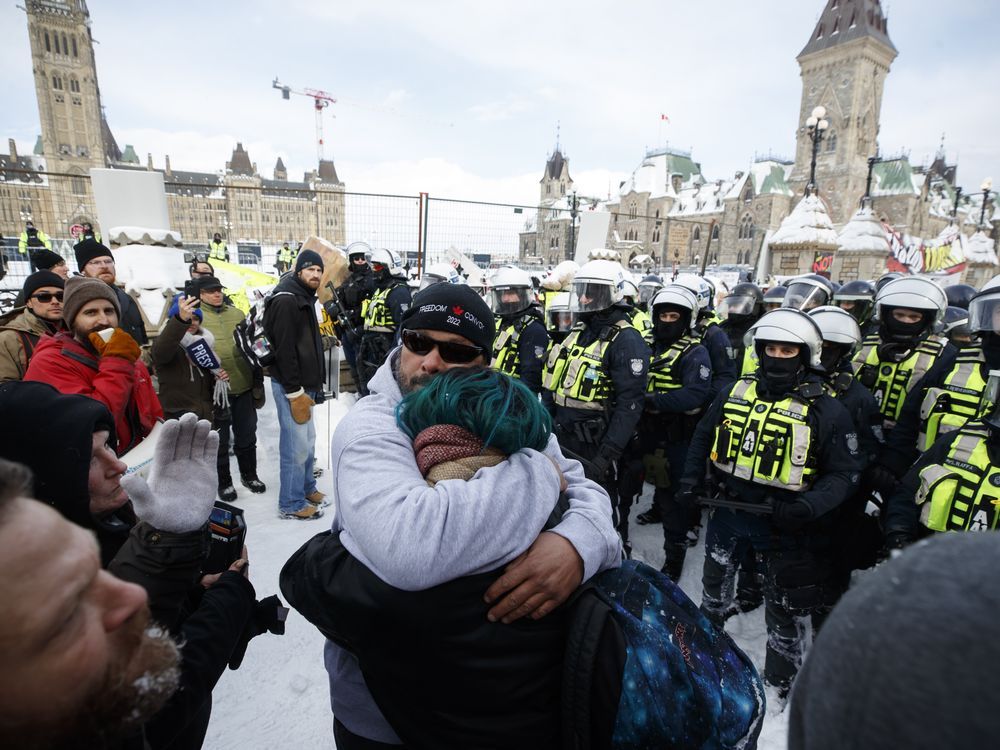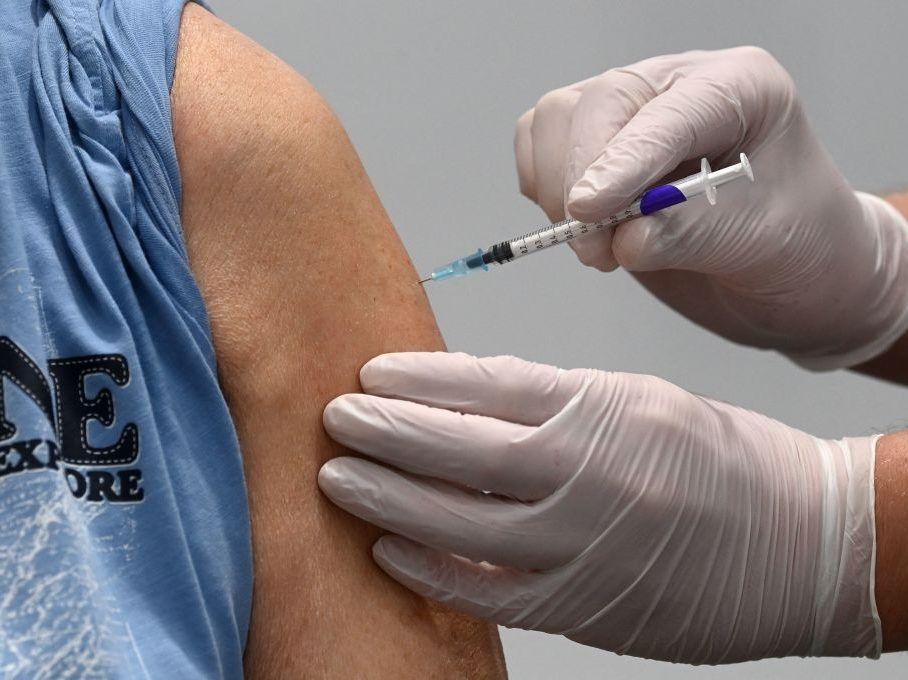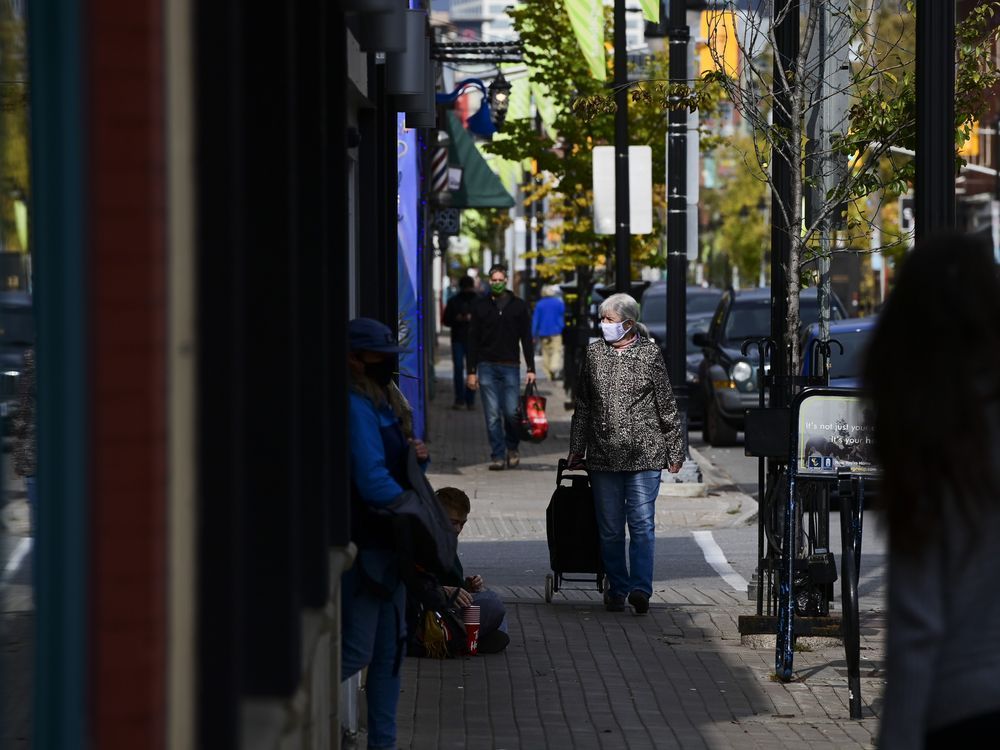Be kinda funny if the appeals court rules it was "Chicken-Little hysteria."Ottawa appeals court decision finding use of Emergencies Act was unreasonable
COVID-19 'Pandemic'
- Thread starter Ocean Breeze
- Start date
You are using an out of date browser. It may not display this or other websites correctly.
You should upgrade or use an alternative browser.
You should upgrade or use an alternative browser.
Nothing like doubling down on stupid. Or wasting taxpayers money. When the clowns lose this appeal, the resulting costs should be born by the LPC, not taxpayers.Ottawa appeals court decision finding use of Emergencies Act was unreasonable
Author of the article:Canadian Press
Canadian Press
Published Feb 23, 2024 • Last updated 1 day ago • 1 minute read
Ottawa has filed to appeal a Federal Court decision that found its invocation of the Emergencies Act in response to the 2022 Freedom Convoy protests was unjustified.
The government is asking the Federal Court of Appeal to overturn a January decision that found the government’s use of emergency law led to the infringement of constitutional rights.
The federal Liberals invoked emergency powers in response to thousands of protesters who entrenched themselves in downtown Ottawa for weeks and spinoff protests that blockaded border crossings.
The Canadian Civil Liberties Association and others argued in court that Ottawa ushered in the emergency measures without sound statutory grounds.
Federal Court Justice Richard Mosley’s decision, which the Liberals immediately promised to appeal, differed from the conclusion of the Public Order Emergency Commission.
That inquiry found the government met the very high legal standard for using the law.
In the documents filed Thursday, the government outlined arguments including that the Federal Court erred by reviewing the decision to invoke the act “with the benefit of hindsight” and based on information not available to the government in 2022.
The court also made a mistake in substituting its own opinion about the decision the government should have made, it said.
Instead, it said, the court should have looked at whether it was reasonable for the government to “decide that it had reasonable grounds to believe” that a public order emergency existed and needed to be dealt with through special temporary measures.
The court was also wrong to decide the invocation of the Emergencies Act was a violation of the Canadian Charter of Rights and Freedoms, the government argued.

Ottawa appeals court decision finding use of Emergencies Act was unreasonable
Ottawa has filed to appeal a Federal Court decision that found its invocation of the Emergencies Act was unjustified.torontosun.com
Its nit aboot getting away with it, its aboot the very very very expensive class action taxpayer will be stuck with.Nothing like doubling down on stupid. Or wasting taxpayers money. When the clowns lose this appeal, the resulting costs should be born by the LPC, not taxpayers.
Who knows, maybe Canadians will scream "Trump" and sue PM and accomplice MPs in civil court?
One Republican lawmaker is worrying about vaccines being injected into lettuce.
LETTUCE KNOW ABOUT VAXXED PLANTS, REPUBLICAN LAWMAKER SAYS
This is taking vaccine paranoia to a whole new level.
Republican lawmaker Scott Cepicky of Tennessee recently claimed during a House health committee meeting that citizens should be wary of vaccines being injected into produce found in grocery stores. Cepicky said the University of California, Riverside campus had perfected the vaccination of lettuce, while noting the Berkeley campus had done similar tests on tomatoes, as reported by Newsweek.
Democratic chair John Ray Clemmons questioned Cepicky if any of it is legal, to which he said “I’m not arguing that point.” Cepicky said there’s no law that states heads of lettuce sold at grocery stores have vaccines, noting vaccinated plants should be listed as pharmaceuticals “so people can get the proper dosage.”
Cepicky was referring to a September 2021 article published by UC Riverside about school scientists studying whether they could turn edible plants like lettuce into mRNA “vaccine factories” in a similar fashion to how COVID-19 vaccines employed messenger RNA (mRNA) technology to battle infectious disease.
So far, the ability to recreate mRNA vaccines in plants had been unsuccessful, a University of California spokesperson told Newsweek, noting the feasibility is still being tested and the technology still does not exist.
Clemmons questioned whether vaccinated lettuce is available in grocery stores under state law. Cepicky said he’d rather have a consumer protection bill, warning customers about what they’re buying.
“When you go into a grocery store, you should know … This head of lettuce is a head of lettuce, the head of lettuce right next to it could include a vaccine in it,” said Cepicky.

 newsweek.com
newsweek.com

 universityofcalifornia.edu
universityofcalifornia.edu

 newsweek.com
newsweek.com
LETTUCE KNOW ABOUT VAXXED PLANTS, REPUBLICAN LAWMAKER SAYS
This is taking vaccine paranoia to a whole new level.
Republican lawmaker Scott Cepicky of Tennessee recently claimed during a House health committee meeting that citizens should be wary of vaccines being injected into produce found in grocery stores. Cepicky said the University of California, Riverside campus had perfected the vaccination of lettuce, while noting the Berkeley campus had done similar tests on tomatoes, as reported by Newsweek.
Democratic chair John Ray Clemmons questioned Cepicky if any of it is legal, to which he said “I’m not arguing that point.” Cepicky said there’s no law that states heads of lettuce sold at grocery stores have vaccines, noting vaccinated plants should be listed as pharmaceuticals “so people can get the proper dosage.”
Cepicky was referring to a September 2021 article published by UC Riverside about school scientists studying whether they could turn edible plants like lettuce into mRNA “vaccine factories” in a similar fashion to how COVID-19 vaccines employed messenger RNA (mRNA) technology to battle infectious disease.
So far, the ability to recreate mRNA vaccines in plants had been unsuccessful, a University of California spokesperson told Newsweek, noting the feasibility is still being tested and the technology still does not exist.
Clemmons questioned whether vaccinated lettuce is available in grocery stores under state law. Cepicky said he’d rather have a consumer protection bill, warning customers about what they’re buying.
“When you go into a grocery store, you should know … This head of lettuce is a head of lettuce, the head of lettuce right next to it could include a vaccine in it,” said Cepicky.

Florida official raises alarms about DNA in COVID-19 vaccines
Florida Surgeon General Joseph Ladapo raised concerns to the FDA, saying fragmented DNA in COVID vaccines could theoretically make healthy cells cancerous.

Grow and eat your own vaccines?
A new project will study whether edible plants like lettuce into mRNA vaccine factories.

Republican suggests vaccines may be getting injected into lettuce
A Tennessee state lawmaker said that vaccinated plants should be listed as pharmaceuticals "so people can get the proper dosage."
Long COVID may cause cognitive decline of about 6 IQ points, study finds
Author of the article:Washington Post
Washington Post
Victoria Bisset, The Washington Post
Published Feb 29, 2024 • 4 minute read
A new study has found people suffering from long COVID showed negative effects on cognition and memory.
A new study has found people suffering from long COVID showed negative effects on cognition and memory.
It’s more than four years since the first cases of COVID-19 were identified — but many of its longer-term effects, including for those living with long COVID, remain unclear.
Now, a new study has some worrying findings that suggest COVID may have longer-term effects on cognition and memory — and that these lead to measurable differences in cognitive performance.
The study, published Thursday in the New England Journal of Medicine, found that participants who recovered from COVID symptoms had a cognitive deficit equivalent to three IQ points compared with those who were never infected, while participants suffering from unresolved COVID symptoms lasting 12 weeks or more experienced a loss equivalent to six IQ points.
But researchers also stressed that the greater cognitive decline associated with persistent symptoms may not be permanent, as participants in this category who had recovered by the time they took part in the study were found to have cognitive deficits comparable to those who recovered quickly. Adam Hampshire, the study’s lead author and a professor in restorative neurosciences at Imperial College London, said in a telephone interview Thursday that the improvement for those who previously had longer-term symptoms “gives us a little bit of hope that those who are struggling with long COVID at the moment — when their symptoms eventually resolve — may experience some cognitive recovery.”
Based on previous studies, researchers were “fully expecting to see cognitive deficits in people who’ve been severely ill, who’ve been in intensive care,” he said — but “we were quite surprised to see any difference at all between people who had short-duration symptoms and the no-COVID group.”
Cognitive effect greater for those infected earlier
The study involved a number of online tasks designed to measure participants’ cognitive function. More than 140,000 people completed at least one of the tasks, while almost 113,000 finished all eight.
The participants were from a cohort of more than 3 million adults who were randomly selected as part of a major English study to track the spread of COVID between May 1, 2020, and March 21, 2022.
As there is no scientific consensus around the definition of long COVID, the study instead looked at symptom duration, comparing the results of people who had not had COVID to those who were infected but recovered in less than four weeks, those who recovered between four and 12 weeks and those whose symptoms continued after that.
The study found a greater cognitive effect among people who were infected earlier in the pandemic, while those who were admitted to the intensive care unit had a particularly striking loss — equivalent to around nine IQ points compared with people who hadn’t had COVID — though the study noted that as the pandemic progressed, fewer people required intensive care.
Among those infected with COVID, the study also found “a small cognitive advantage among participants who had received two or more vaccinations” when they contracted the coronavirus, “and a minimal effect of repeat episodes.”
‘Multiple underlying factors’ may be responsible
The tests covered various aspects of cognitive performance but found that tasks involving memory, reasoning and planning “were among the most sensitive to COVID-19-related cognitive differences.”
“Our results confirmed associations of cognitive deficits with mood swings and fatigue but also with a variety of other symptoms,” it said. “Therefore, it is likely that multiple underlying factors contribute to cognitive deficits after COVID-19.”
Hampshire said the findings also broaden an understanding of brain fog, a symptom reported by many long-COVID sufferers, especially given the subjective nature of symptoms.
“What we found is that people reporting brain fog post-COVID also perform less well on tasks that measure memory and executive functions,” he explained. “So that gives us some insight into what brain fog actually is.”
“Even if cognitive deficits after COVID-19 are of small magnitude on average, a substantial minority of people have more significant deficits which are likely to affect their ability to work and function,” said Maxime Taquet, a clinical fellow in psychiatry at the University of Oxford, who was not involved in the research. “Given the scale of the pandemic and the number of people affected, this is particularly worrisome.”
We still don’t know the clinical implication of a three-point difference in IQ for people who recovered from COVID, but within that average finding “there will be substantial variability, there’s likely to be some people who were worse affected,” Hampshire said.
The study had a number of limitations. The researchers did not have information on individuals’ cognitive abilities before they were infected and therefore compared their results to those of participants who hadn’t had COVID, rather than measuring the change in their own cognition.
The authors also noted that there could have been some participant self-selection bias, as those most affected by cognitive impairment may be unable or unwilling to take part in the cognitive assessments. Women and White people were “slightly overrepresented” in the study — though the authors argued that the large sample size meant that the data was still meaningful.
An editorial about the study published Thursday in the same journal said the findings are concerning. It added that questions remain, including on the persistence of the cognitive deficits and the effect on work, education “and other activities that require intact cognitive abilities.”
The study adds to a growing body of research into the effect of long COVID, whose symptoms may include fatigue, memory loss, chest pain, diarrhea and rapid heart rates. One analysis published in August found that even mild infections can lead to a higher risk of lung problems, fatigue, diabetes and certain other health problems typical of long COVID two years later.

 torontosun.com
torontosun.com
Author of the article:Washington Post
Washington Post
Victoria Bisset, The Washington Post
Published Feb 29, 2024 • 4 minute read
A new study has found people suffering from long COVID showed negative effects on cognition and memory.
A new study has found people suffering from long COVID showed negative effects on cognition and memory.
It’s more than four years since the first cases of COVID-19 were identified — but many of its longer-term effects, including for those living with long COVID, remain unclear.
Now, a new study has some worrying findings that suggest COVID may have longer-term effects on cognition and memory — and that these lead to measurable differences in cognitive performance.
The study, published Thursday in the New England Journal of Medicine, found that participants who recovered from COVID symptoms had a cognitive deficit equivalent to three IQ points compared with those who were never infected, while participants suffering from unresolved COVID symptoms lasting 12 weeks or more experienced a loss equivalent to six IQ points.
But researchers also stressed that the greater cognitive decline associated with persistent symptoms may not be permanent, as participants in this category who had recovered by the time they took part in the study were found to have cognitive deficits comparable to those who recovered quickly. Adam Hampshire, the study’s lead author and a professor in restorative neurosciences at Imperial College London, said in a telephone interview Thursday that the improvement for those who previously had longer-term symptoms “gives us a little bit of hope that those who are struggling with long COVID at the moment — when their symptoms eventually resolve — may experience some cognitive recovery.”
Based on previous studies, researchers were “fully expecting to see cognitive deficits in people who’ve been severely ill, who’ve been in intensive care,” he said — but “we were quite surprised to see any difference at all between people who had short-duration symptoms and the no-COVID group.”
Cognitive effect greater for those infected earlier
The study involved a number of online tasks designed to measure participants’ cognitive function. More than 140,000 people completed at least one of the tasks, while almost 113,000 finished all eight.
The participants were from a cohort of more than 3 million adults who were randomly selected as part of a major English study to track the spread of COVID between May 1, 2020, and March 21, 2022.
As there is no scientific consensus around the definition of long COVID, the study instead looked at symptom duration, comparing the results of people who had not had COVID to those who were infected but recovered in less than four weeks, those who recovered between four and 12 weeks and those whose symptoms continued after that.
The study found a greater cognitive effect among people who were infected earlier in the pandemic, while those who were admitted to the intensive care unit had a particularly striking loss — equivalent to around nine IQ points compared with people who hadn’t had COVID — though the study noted that as the pandemic progressed, fewer people required intensive care.
Among those infected with COVID, the study also found “a small cognitive advantage among participants who had received two or more vaccinations” when they contracted the coronavirus, “and a minimal effect of repeat episodes.”
‘Multiple underlying factors’ may be responsible
The tests covered various aspects of cognitive performance but found that tasks involving memory, reasoning and planning “were among the most sensitive to COVID-19-related cognitive differences.”
“Our results confirmed associations of cognitive deficits with mood swings and fatigue but also with a variety of other symptoms,” it said. “Therefore, it is likely that multiple underlying factors contribute to cognitive deficits after COVID-19.”
Hampshire said the findings also broaden an understanding of brain fog, a symptom reported by many long-COVID sufferers, especially given the subjective nature of symptoms.
“What we found is that people reporting brain fog post-COVID also perform less well on tasks that measure memory and executive functions,” he explained. “So that gives us some insight into what brain fog actually is.”
“Even if cognitive deficits after COVID-19 are of small magnitude on average, a substantial minority of people have more significant deficits which are likely to affect their ability to work and function,” said Maxime Taquet, a clinical fellow in psychiatry at the University of Oxford, who was not involved in the research. “Given the scale of the pandemic and the number of people affected, this is particularly worrisome.”
We still don’t know the clinical implication of a three-point difference in IQ for people who recovered from COVID, but within that average finding “there will be substantial variability, there’s likely to be some people who were worse affected,” Hampshire said.
The study had a number of limitations. The researchers did not have information on individuals’ cognitive abilities before they were infected and therefore compared their results to those of participants who hadn’t had COVID, rather than measuring the change in their own cognition.
The authors also noted that there could have been some participant self-selection bias, as those most affected by cognitive impairment may be unable or unwilling to take part in the cognitive assessments. Women and White people were “slightly overrepresented” in the study — though the authors argued that the large sample size meant that the data was still meaningful.
An editorial about the study published Thursday in the same journal said the findings are concerning. It added that questions remain, including on the persistence of the cognitive deficits and the effect on work, education “and other activities that require intact cognitive abilities.”
The study adds to a growing body of research into the effect of long COVID, whose symptoms may include fatigue, memory loss, chest pain, diarrhea and rapid heart rates. One analysis published in August found that even mild infections can lead to a higher risk of lung problems, fatigue, diabetes and certain other health problems typical of long COVID two years later.

Long COVID may cause cognitive decline of about 6 IQ points, study finds
It's more than four years since the first cases of COVID-19 were identified — but many of its longer-term effects remain unclear.
COVID-19 may have been created by scientists in Wuhan lab: Professor
Author of the article enette Wilford
enette Wilford
Published Mar 01, 2024 • Last updated 4 days ago • 3 minute read
A professor in the U.S. suggests that evidence of COVID-19 being created in a Chinese lab has reached “smoking gun” levels.
Richard H. Ebright, a molecular biologist at Rutgers University, told the Wall Street Journal’s Nicholas Wade that the coronavirus may have actually been created in China’s Wuhan Institute of Virology.
He used a 2018 document from the lab as evidence that referenced making such a virus.
“(The document) elevates the evidence provided by the genome sequence from the level of noteworthy to the level of a smoking gun,” Ebright claimed, according to the WSJ.
Drafts and notes from the papers mention a grant proposal called Project DEFUSE, which detailed how to engineer bat coronaviruses to make them more transmissible.
The proposal was rejected and the U.S. Defense Advanced Research Projects Agency denied it funding. However, it was suggested that Wuhan researchers could have continued the work if the Chinese government backed the project.
“Viruses made according to the DEFUSE protocol could have been available by the time COVID-19 broke out, sometime between August and November 2019,” Wade, a former science editor of the New York Times, wrote in the article.
“This would account for the otherwise unexplained timing of the pandemic along with its place of origin.”
Wade claimed that along with the research notes, the specific genetic structure of the coronavirus that allowed it to infect humans served as another strong indication the virus was “the product of laboratory synthesis, not of nature.”
Wade wrote: “Whereas most viruses require repeated tries to switch from an animal host to people, SARS-CoV-2 infected humans out of the box, as if it had been preadapted while growing in the humanized mice called for in the DEFUSE protocol.”
Ebright has long believed there was credibility that the work proposed by the now-controversial EcoHealth Alliance led to the development COVID-19.
Following the release of the 2018 documents pertaining to Project DEFUSE, Ebright claimed there was clearer evidence that the virus was manufactured in a lab, the Telegraph reported.
Chinese researchers proposed introducing “appropriate human-specific cleavage sites” to the spike proteins of SARS-related viruses in the lab.
That is the same method several biologists have previously said could have been used to synthesize the coronavirus that led to the pandemic.
The researchers had planned to conduct a portion of the research at the Wuhan lab where they noted that safety conditions were not up to U.S. standards, to the point where they claimed American scientists would “likely freak out,” according to the documents.
Dr. Filippa Lentzos, an associate professor of science and international security at King’s College London, said the world needed to accept the possibility that the virus was likely synthesized.
Speaking before the United Nations in New York on Wednesday, Lentzos presented the work of the Independent Task Force on Research with Pandemic Risks.
“We have to acknowledge the fact that the pandemic could have started from some research-related incident,” Lentzos said, according to the Telegraph.
“Are we going to find that out? In my view, I think it’s very unlikely that we will. We need to do better in the future,” she continued before adding ominously, “We are going to see more ambiguous events.”

 telegraph.co.uk
telegraph.co.uk

 torontosun.com
torontosun.com
Author of the article
Published Mar 01, 2024 • Last updated 4 days ago • 3 minute read
A professor in the U.S. suggests that evidence of COVID-19 being created in a Chinese lab has reached “smoking gun” levels.
Richard H. Ebright, a molecular biologist at Rutgers University, told the Wall Street Journal’s Nicholas Wade that the coronavirus may have actually been created in China’s Wuhan Institute of Virology.
He used a 2018 document from the lab as evidence that referenced making such a virus.
“(The document) elevates the evidence provided by the genome sequence from the level of noteworthy to the level of a smoking gun,” Ebright claimed, according to the WSJ.
Drafts and notes from the papers mention a grant proposal called Project DEFUSE, which detailed how to engineer bat coronaviruses to make them more transmissible.
The proposal was rejected and the U.S. Defense Advanced Research Projects Agency denied it funding. However, it was suggested that Wuhan researchers could have continued the work if the Chinese government backed the project.
“Viruses made according to the DEFUSE protocol could have been available by the time COVID-19 broke out, sometime between August and November 2019,” Wade, a former science editor of the New York Times, wrote in the article.
“This would account for the otherwise unexplained timing of the pandemic along with its place of origin.”
Wade claimed that along with the research notes, the specific genetic structure of the coronavirus that allowed it to infect humans served as another strong indication the virus was “the product of laboratory synthesis, not of nature.”
Wade wrote: “Whereas most viruses require repeated tries to switch from an animal host to people, SARS-CoV-2 infected humans out of the box, as if it had been preadapted while growing in the humanized mice called for in the DEFUSE protocol.”
Ebright has long believed there was credibility that the work proposed by the now-controversial EcoHealth Alliance led to the development COVID-19.
Following the release of the 2018 documents pertaining to Project DEFUSE, Ebright claimed there was clearer evidence that the virus was manufactured in a lab, the Telegraph reported.
Chinese researchers proposed introducing “appropriate human-specific cleavage sites” to the spike proteins of SARS-related viruses in the lab.
That is the same method several biologists have previously said could have been used to synthesize the coronavirus that led to the pandemic.
The researchers had planned to conduct a portion of the research at the Wuhan lab where they noted that safety conditions were not up to U.S. standards, to the point where they claimed American scientists would “likely freak out,” according to the documents.
Dr. Filippa Lentzos, an associate professor of science and international security at King’s College London, said the world needed to accept the possibility that the virus was likely synthesized.
Speaking before the United Nations in New York on Wednesday, Lentzos presented the work of the Independent Task Force on Research with Pandemic Risks.
“We have to acknowledge the fact that the pandemic could have started from some research-related incident,” Lentzos said, according to the Telegraph.
“Are we going to find that out? In my view, I think it’s very unlikely that we will. We need to do better in the future,” she continued before adding ominously, “We are going to see more ambiguous events.”

Covid pandemic may have been started by scientists, professor tells UN
Dr Filippa Lentzos calls for better regulation after saying coronavirus may be from ‘research-related incident’

COVID-19 may have been created by scientists in Wuhan lab: Professor
One professor suggests that evidence of COVID-19 being created in a Chinese lab has reached “smoking gun” levels.
No shit Sherlock .COVID-19 may have been created by scientists in Wuhan lab: Professor
Author of the articleenette Wilford
Published Mar 01, 2024 • Last updated 4 days ago • 3 minute read
A professor in the U.S. suggests that evidence of COVID-19 being created in a Chinese lab has reached “smoking gun” levels.
Richard H. Ebright, a molecular biologist at Rutgers University, told the Wall Street Journal’s Nicholas Wade that the coronavirus may have actually been created in China’s Wuhan Institute of Virology.
He used a 2018 document from the lab as evidence that referenced making such a virus.
“(The document) elevates the evidence provided by the genome sequence from the level of noteworthy to the level of a smoking gun,” Ebright claimed, according to the WSJ.
Drafts and notes from the papers mention a grant proposal called Project DEFUSE, which detailed how to engineer bat coronaviruses to make them more transmissible.
The proposal was rejected and the U.S. Defense Advanced Research Projects Agency denied it funding. However, it was suggested that Wuhan researchers could have continued the work if the Chinese government backed the project.
“Viruses made according to the DEFUSE protocol could have been available by the time COVID-19 broke out, sometime between August and November 2019,” Wade, a former science editor of the New York Times, wrote in the article.
“This would account for the otherwise unexplained timing of the pandemic along with its place of origin.”
Wade claimed that along with the research notes, the specific genetic structure of the coronavirus that allowed it to infect humans served as another strong indication the virus was “the product of laboratory synthesis, not of nature.”
Wade wrote: “Whereas most viruses require repeated tries to switch from an animal host to people, SARS-CoV-2 infected humans out of the box, as if it had been preadapted while growing in the humanized mice called for in the DEFUSE protocol.”
Ebright has long believed there was credibility that the work proposed by the now-controversial EcoHealth Alliance led to the development COVID-19.
Following the release of the 2018 documents pertaining to Project DEFUSE, Ebright claimed there was clearer evidence that the virus was manufactured in a lab, the Telegraph reported.
Chinese researchers proposed introducing “appropriate human-specific cleavage sites” to the spike proteins of SARS-related viruses in the lab.
That is the same method several biologists have previously said could have been used to synthesize the coronavirus that led to the pandemic.
The researchers had planned to conduct a portion of the research at the Wuhan lab where they noted that safety conditions were not up to U.S. standards, to the point where they claimed American scientists would “likely freak out,” according to the documents.
Dr. Filippa Lentzos, an associate professor of science and international security at King’s College London, said the world needed to accept the possibility that the virus was likely synthesized.
Speaking before the United Nations in New York on Wednesday, Lentzos presented the work of the Independent Task Force on Research with Pandemic Risks.
“We have to acknowledge the fact that the pandemic could have started from some research-related incident,” Lentzos said, according to the Telegraph.
“Are we going to find that out? In my view, I think it’s very unlikely that we will. We need to do better in the future,” she continued before adding ominously, “We are going to see more ambiguous events.”

Covid pandemic may have been started by scientists, professor tells UN
Dr Filippa Lentzos calls for better regulation after saying coronavirus may be from ‘research-related incident’telegraph.co.uk

COVID-19 may have been created by scientists in Wuhan lab: Professor
One professor suggests that evidence of COVID-19 being created in a Chinese lab has reached “smoking gun” levels.torontosun.com
A Corona virus appearing in the same city as a lab where they create corona variants is as obvious as a chocolate outbreak in Hersey Pennsylvania.No shit Sherlock .
(I heard the chocolate outbreak in Hersey Pennsylvania came from wild bats)A Corona virus appearing in the same city as a lab where they create corona variants is as obvious as a chocolate outbreak in Hersey Pennsylvania.
German man claims he’s been vaccinated against COVID more than 200 times
Author of the article enette Wilford
enette Wilford
Published Mar 06, 2024 • Last updated 1 day ago • 1 minute read
A 62-year-old man’s immune system was studied after he claimed to have received 217 COVID vaccine shots.
The man, who was not identified, privately purchased and administered many of the doses between June 2021 and October 2023.
His case was documented in The Lancet Infectious Diseases journal, in which researchers from the University of Erlangen-Nuremberg said the man appears to be in good health and has suffered no negative side effects.
“We learned about his case via newspaper articles,” said Dr. Kilian Schober, who works in the university’s microbiology department.
“We then contacted him and invited him to undergo various tests in Erlangen,” Schober added. “He was very interested in doing so.”
Schober and his team were prompted to study the hyper-vaccinated man to test whether overstimulating the immune system with so many vaccines may have destroyed or depleted immune cells, hindering the body’s ability to fight off illness.
Researchers found no evidence of an impaired immune system or that the man had ever been infected with the coronavirus.
“We were able to take blood samples ourselves when the man received a further vaccination during the study at his own insistence,” Schober said.
“We were able to use these samples to determine exactly how the immune system reacts to the vaccination.”
Researchers noted they are not recommending people get so many shots, adding they could not make any conclusions about the safety of taking so much of the vaccine.
“Importantly, we do not endorse hyper-vaccination as a strategy to enhance adaptive immunity.”
They wrote on the university’s website: “Current research indicates that a three-dose vaccination, coupled with regular top-up vaccines for vulnerable groups, remains the favoured approach.”

 torontosun.com
torontosun.com
Author of the article
Published Mar 06, 2024 • Last updated 1 day ago • 1 minute read
A 62-year-old man’s immune system was studied after he claimed to have received 217 COVID vaccine shots.
The man, who was not identified, privately purchased and administered many of the doses between June 2021 and October 2023.
His case was documented in The Lancet Infectious Diseases journal, in which researchers from the University of Erlangen-Nuremberg said the man appears to be in good health and has suffered no negative side effects.
“We learned about his case via newspaper articles,” said Dr. Kilian Schober, who works in the university’s microbiology department.
“We then contacted him and invited him to undergo various tests in Erlangen,” Schober added. “He was very interested in doing so.”
Schober and his team were prompted to study the hyper-vaccinated man to test whether overstimulating the immune system with so many vaccines may have destroyed or depleted immune cells, hindering the body’s ability to fight off illness.
Researchers found no evidence of an impaired immune system or that the man had ever been infected with the coronavirus.
“We were able to take blood samples ourselves when the man received a further vaccination during the study at his own insistence,” Schober said.
“We were able to use these samples to determine exactly how the immune system reacts to the vaccination.”
Researchers noted they are not recommending people get so many shots, adding they could not make any conclusions about the safety of taking so much of the vaccine.
“Importantly, we do not endorse hyper-vaccination as a strategy to enhance adaptive immunity.”
They wrote on the university’s website: “Current research indicates that a three-dose vaccination, coupled with regular top-up vaccines for vulnerable groups, remains the favoured approach.”

German man claims he’s been vaccinated against COVID more than 200 times
A 62-year-old man’s immune system was studied after he claimed to have received the vaccine for COVID-19 217 times.
CFIB says 200,000 small businesses took new loans to meet CEBA repayment deadline
Author of the article:Canadian Press
Canadian Press
Published Mar 26, 2024 • Last updated 1 day ago • 1 minute read
At least 200,000 small businesses took on new debt to refinance their Canadian Emergency Business Account loans to access their forgivable portion of the loan, says the Canadian Federation of Independent Business.
At least 200,000 small businesses took on new debt to refinance their Canadian Emergency Business Account loans to access their forgivable portion of the loan, says the Canadian Federation of Independent Business.
TORONTO — Roughly 200,000 small businesses took on new debt to refinance their Canada Emergency Business Account loans to access the forgivable portion of the loan, says the Canadian Federation of Independent Business.
CFIB president Dan Kelly says many businesses that had to borrow to repay their CEBA loans are facing high interest rates and will be challenged to meet their payment obligations.
More than 50,000 small businesses are also pursuing a special extension to Thursday as they are in the process of refinancing.
The federal government provided interest-free loans to small businesses to help recover from losses during the COVID-19 pandemic.
Businesses that met the Jan. 18 repayment deadline could access 25 per cent forgiveness of their loans.
Corinne Pohlmann of CFIB says Ottawa should do more to help businesses deal with the high cost of operations and provide concrete financial relief measures in the upcoming federal budget.

 torontosun.com
torontosun.com
Author of the article:Canadian Press
Canadian Press
Published Mar 26, 2024 • Last updated 1 day ago • 1 minute read
At least 200,000 small businesses took on new debt to refinance their Canadian Emergency Business Account loans to access their forgivable portion of the loan, says the Canadian Federation of Independent Business.
At least 200,000 small businesses took on new debt to refinance their Canadian Emergency Business Account loans to access their forgivable portion of the loan, says the Canadian Federation of Independent Business.
TORONTO — Roughly 200,000 small businesses took on new debt to refinance their Canada Emergency Business Account loans to access the forgivable portion of the loan, says the Canadian Federation of Independent Business.
CFIB president Dan Kelly says many businesses that had to borrow to repay their CEBA loans are facing high interest rates and will be challenged to meet their payment obligations.
More than 50,000 small businesses are also pursuing a special extension to Thursday as they are in the process of refinancing.
The federal government provided interest-free loans to small businesses to help recover from losses during the COVID-19 pandemic.
Businesses that met the Jan. 18 repayment deadline could access 25 per cent forgiveness of their loans.
Corinne Pohlmann of CFIB says Ottawa should do more to help businesses deal with the high cost of operations and provide concrete financial relief measures in the upcoming federal budget.

CFIB says 200,000 small businesses took new loans to meet CEBA repayment deadline
Roughly 200,000 small businesses took on new debt to refinance their Canada Emergency Business Account loans.
Small businesses taking on new debt to repay CEBA loans
Author of the article:Kevin Connor
Published Mar 26, 2024 • Last updated 1 day ago • 2 minute read
The Canadian Federation of Independent Business says a “staggering” 200,000 small businesses needed to take on new debt to refinance their Canadian Emergency Business Account loans to keep access to the forgivable portion.
There are over 50,000 small firms that are still seeking a special extension to the March 28 deadline for those in the process of refinancing.
“Many of those businesses that had to borrow to repay their CEBA loans are facing high interest rates and will be challenged to meet their payment obligations,” said Dan Kelly, CFIB president.
“We need to remember while government got a lot of CEBA balances repaid, the debt for many businesses didn’t suddenly go away – it just shifted from a low interest government-backed loan to a higher interest bank loan. This should sound the alarm for policymakers, particularly given the business insolvencies are surging.”
The Federation says the business environment in Canada is not back to normal.
The Federation also says the financial situation is the primary concern for one in five small business owners and that business insolvencies have jumped by 129.3% in January 2024 compared to January 2023
As Ottawa winds down its CEBA program, the Federation wants government to put in place a review process for CEBA loan holders deemed ineligible and introduce a three-year repayment plan.
The Federation wants flexibility is for those who have attempted to take out a refinancing loan to use the special extension to March 28.
The Federation wants banks to accept any form of communication requesting refinancing as sufficient proof for the extension.
“Small business owners face massive debt loads and cost increases, and many feel abandoned by the government and the way it handled the repayment of the CEBA program,” said Corinne Pohlmann, Executive Vice-President of Advocacy at CFIB.
“Ottawa should do more to help them deal with the high cost of doing business and provide concrete financial relief measures in the upcoming federal budget, such as lowering the Employment Insurance premiums for small employers and returning the $2.5 billion in carbon tax revenue owed to small businesses.”
The survey was conducted from February 8-21, 2024, and based on a sample of 4,092 CFIB members and has a margin of error of +/-1.5%, 19 times out of 20.

 torontosun.com
torontosun.com
Author of the article:Kevin Connor
Published Mar 26, 2024 • Last updated 1 day ago • 2 minute read
The Canadian Federation of Independent Business says a “staggering” 200,000 small businesses needed to take on new debt to refinance their Canadian Emergency Business Account loans to keep access to the forgivable portion.
There are over 50,000 small firms that are still seeking a special extension to the March 28 deadline for those in the process of refinancing.
“Many of those businesses that had to borrow to repay their CEBA loans are facing high interest rates and will be challenged to meet their payment obligations,” said Dan Kelly, CFIB president.
“We need to remember while government got a lot of CEBA balances repaid, the debt for many businesses didn’t suddenly go away – it just shifted from a low interest government-backed loan to a higher interest bank loan. This should sound the alarm for policymakers, particularly given the business insolvencies are surging.”
The Federation says the business environment in Canada is not back to normal.
The Federation also says the financial situation is the primary concern for one in five small business owners and that business insolvencies have jumped by 129.3% in January 2024 compared to January 2023
As Ottawa winds down its CEBA program, the Federation wants government to put in place a review process for CEBA loan holders deemed ineligible and introduce a three-year repayment plan.
The Federation wants flexibility is for those who have attempted to take out a refinancing loan to use the special extension to March 28.
The Federation wants banks to accept any form of communication requesting refinancing as sufficient proof for the extension.
“Small business owners face massive debt loads and cost increases, and many feel abandoned by the government and the way it handled the repayment of the CEBA program,” said Corinne Pohlmann, Executive Vice-President of Advocacy at CFIB.
“Ottawa should do more to help them deal with the high cost of doing business and provide concrete financial relief measures in the upcoming federal budget, such as lowering the Employment Insurance premiums for small employers and returning the $2.5 billion in carbon tax revenue owed to small businesses.”
The survey was conducted from February 8-21, 2024, and based on a sample of 4,092 CFIB members and has a margin of error of +/-1.5%, 19 times out of 20.

Small businesses taking on new debt to repay CEBA loans
Canadian Emergency Business Account loans
CRA fires 232 people for falsely claiming $2,000 monthly pandemic benefit
Author of the article:Canadian Press
Canadian Press
Published Mar 26, 2024 • 1 minute read
The Canada Revenue Agency has now fired more than 200 people for falsely claiming a federal income benefit during the COVID-19 pandemic.
The Canada Revenue Agency has now fired more than 200 people for falsely claiming a federal income benefit during the COVID-19 pandemic.
OTTAWA — The Canada Revenue Agency has now fired more than 200 people for falsely claiming a federal income benefit during the COVID-19 pandemic.
The CRA says as of March 15, 232 employees “inappropriately applied for and received” the Canada Emergency Response Benefit and have been terminated, an increase of 47 since December.
The benefit, known as CERB for short, provided $2,000 per month to Canadians whose jobs were lost as a result of public health restrictions during the pandemic.
They must repay the CERB funds they received if they have not already done so.
The agency launched an internal review that identified 600 employees for further investigation but not all would have been ineligible for the benefit because some were students or term employees.
The CRA says the case-by-case reviews completed to date confirmed 133 employees properly received the benefit, leaving about 235 files still to be reviewed.

 torontosun.com
torontosun.com
Author of the article:Canadian Press
Canadian Press
Published Mar 26, 2024 • 1 minute read
The Canada Revenue Agency has now fired more than 200 people for falsely claiming a federal income benefit during the COVID-19 pandemic.
The Canada Revenue Agency has now fired more than 200 people for falsely claiming a federal income benefit during the COVID-19 pandemic.
OTTAWA — The Canada Revenue Agency has now fired more than 200 people for falsely claiming a federal income benefit during the COVID-19 pandemic.
The CRA says as of March 15, 232 employees “inappropriately applied for and received” the Canada Emergency Response Benefit and have been terminated, an increase of 47 since December.
The benefit, known as CERB for short, provided $2,000 per month to Canadians whose jobs were lost as a result of public health restrictions during the pandemic.
They must repay the CERB funds they received if they have not already done so.
The agency launched an internal review that identified 600 employees for further investigation but not all would have been ineligible for the benefit because some were students or term employees.
The CRA says the case-by-case reviews completed to date confirmed 133 employees properly received the benefit, leaving about 235 files still to be reviewed.

CRA fires 232 people for falsely claiming $2,000 monthly pandemic benefit
They must repay the CERB funds they received if they have not already done so.
Depressed since pandemic, Halifax museum’s parrot being shipped to Ontario
Author of the article:Canadian Press
Canadian Press
Published Apr 04, 2024 • 1 minute read
Merlin the macaw is seen at the Maritime Museum of the Atlantic in Halifax in a 2014 handout photo. A macaw in Nova Scotia that has been showing signs of depression is now heading to Ontario for a possible change in scenery and to make new friends.
Merlin the macaw is seen at the Maritime Museum of the Atlantic in Halifax in a 2014 handout photo. A macaw in Nova Scotia that has been showing signs of depression is now heading to Ontario for a possible change in scenery and to make new friends. PHOTO BY HO /THE CANADIAN PRESS
HALIFAX — A parrot in Nova Scotia that has been showing signs of depression since the pandemic is moving to Ontario for a change of scenery and to make new friends.
Merlin has been the mascot of the Maritime Museum of the Atlantic in Halifax since 2006, but his routine was disrupted when COVID-19 emerged in 2020 and the museum closed.
A news release from the museum says the lack of interaction with visitors led Merlin to snip his feathers, a sign of stress, and the behaviour continued even after full museum operations resumed.
After consultation with a veterinarian, it was decided that Merlin would leave Halifax on April 15 to join a flock of fellow macaws — large members of the parrot family — at Safari Niagara in Fort Erie, Ont.
The release says Merlin will become part of a family of macaws that spend their days in a “lush, secure and stimulating environment.”
The museum says the 22-year-old Merlin is “quite talkative,” with the words “cracker” and “peek-a-boo” part of his regular vocabulary, and despite his depression, he “laughs on a regular basis.”


 torontosun.com
torontosun.com
Author of the article:Canadian Press
Canadian Press
Published Apr 04, 2024 • 1 minute read
Merlin the macaw is seen at the Maritime Museum of the Atlantic in Halifax in a 2014 handout photo. A macaw in Nova Scotia that has been showing signs of depression is now heading to Ontario for a possible change in scenery and to make new friends.
Merlin the macaw is seen at the Maritime Museum of the Atlantic in Halifax in a 2014 handout photo. A macaw in Nova Scotia that has been showing signs of depression is now heading to Ontario for a possible change in scenery and to make new friends. PHOTO BY HO /THE CANADIAN PRESS
HALIFAX — A parrot in Nova Scotia that has been showing signs of depression since the pandemic is moving to Ontario for a change of scenery and to make new friends.
Merlin has been the mascot of the Maritime Museum of the Atlantic in Halifax since 2006, but his routine was disrupted when COVID-19 emerged in 2020 and the museum closed.
A news release from the museum says the lack of interaction with visitors led Merlin to snip his feathers, a sign of stress, and the behaviour continued even after full museum operations resumed.
After consultation with a veterinarian, it was decided that Merlin would leave Halifax on April 15 to join a flock of fellow macaws — large members of the parrot family — at Safari Niagara in Fort Erie, Ont.
The release says Merlin will become part of a family of macaws that spend their days in a “lush, secure and stimulating environment.”
The museum says the 22-year-old Merlin is “quite talkative,” with the words “cracker” and “peek-a-boo” part of his regular vocabulary, and despite his depression, he “laughs on a regular basis.”


Depressed since pandemic, Halifax museum’s parrot being shipped to Ontario
Merlin has been the mascot of the Maritime Museum of the Atlantic in Halifax since 2006.
if they thought the boid was depressed before, send him to onterrible.Depressed since pandemic, Halifax museum’s parrot being shipped to Ontario
Author of the article:Canadian Press
Canadian Press
Published Apr 04, 2024 • 1 minute read
Merlin the macaw is seen at the Maritime Museum of the Atlantic in Halifax in a 2014 handout photo. A macaw in Nova Scotia that has been showing signs of depression is now heading to Ontario for a possible change in scenery and to make new friends.
Merlin the macaw is seen at the Maritime Museum of the Atlantic in Halifax in a 2014 handout photo. A macaw in Nova Scotia that has been showing signs of depression is now heading to Ontario for a possible change in scenery and to make new friends. PHOTO BY HO /THE CANADIAN PRESS
HALIFAX — A parrot in Nova Scotia that has been showing signs of depression since the pandemic is moving to Ontario for a change of scenery and to make new friends.
Merlin has been the mascot of the Maritime Museum of the Atlantic in Halifax since 2006, but his routine was disrupted when COVID-19 emerged in 2020 and the museum closed.
A news release from the museum says the lack of interaction with visitors led Merlin to snip his feathers, a sign of stress, and the behaviour continued even after full museum operations resumed.
After consultation with a veterinarian, it was decided that Merlin would leave Halifax on April 15 to join a flock of fellow macaws — large members of the parrot family — at Safari Niagara in Fort Erie, Ont.
The release says Merlin will become part of a family of macaws that spend their days in a “lush, secure and stimulating environment.”
The museum says the 22-year-old Merlin is “quite talkative,” with the words “cracker” and “peek-a-boo” part of his regular vocabulary, and despite his depression, he “laughs on a regular basis.”
View attachment 21666

Depressed since pandemic, Halifax museum’s parrot being shipped to Ontario
Merlin has been the mascot of the Maritime Museum of the Atlantic in Halifax since 2006.torontosun.com
Trust it . We are all going to die .The Science....
Eventually.Trust it . We are all going to die .
Stock up on Ivermectin....
Blood on its hands': FDA loses battle against ivermectin, agrees to remove COVID-related anti-drug social media posts
ByShweta Kukreti
Mar 24, 2024 04:44 PM IST
Cricket Page
After losing its battle against ivermectin, the FDA has agreed to take down its social media posts urging people to avoid the usage of ivermectin for COVID.
After losing its battle against ivermectin, the US Food and Drug Administration (FDA) has agreed to remove webpages and its social media posts urging people to avoid the usage of drug for COVID-19 treatment.
